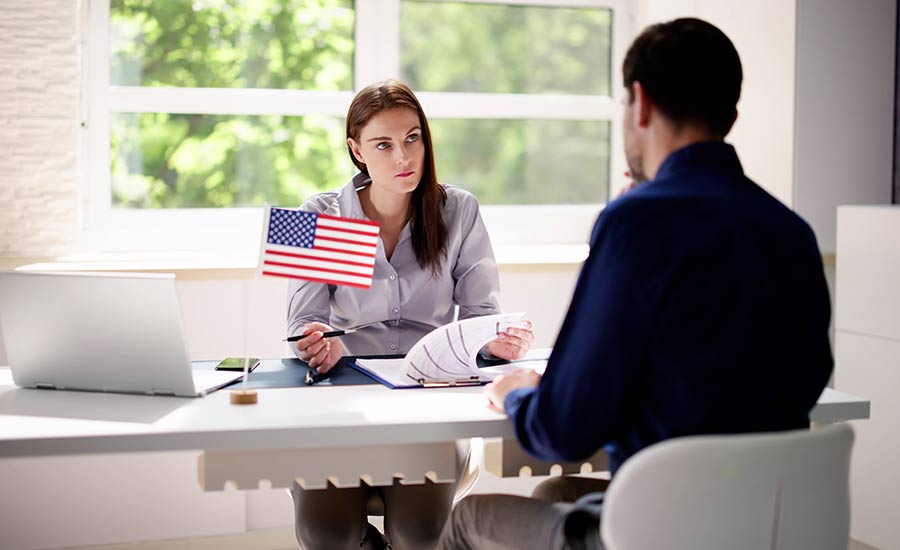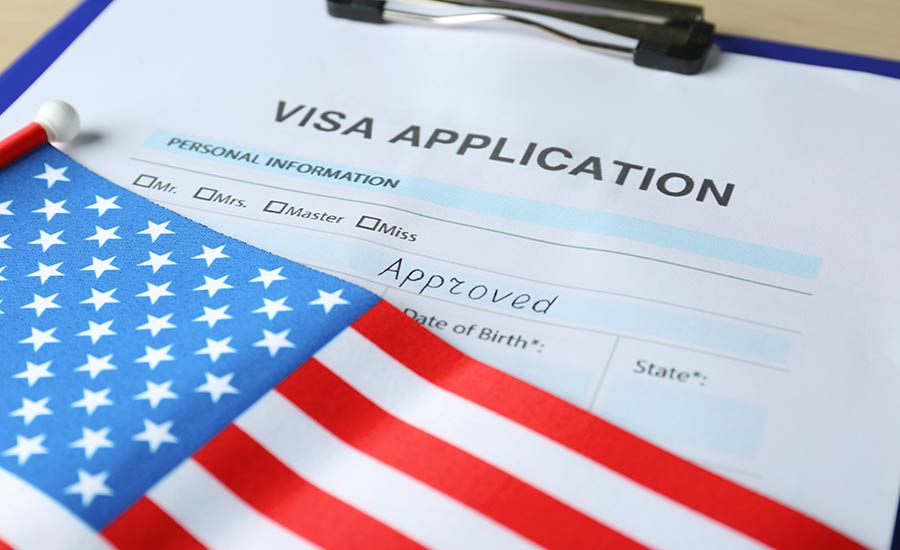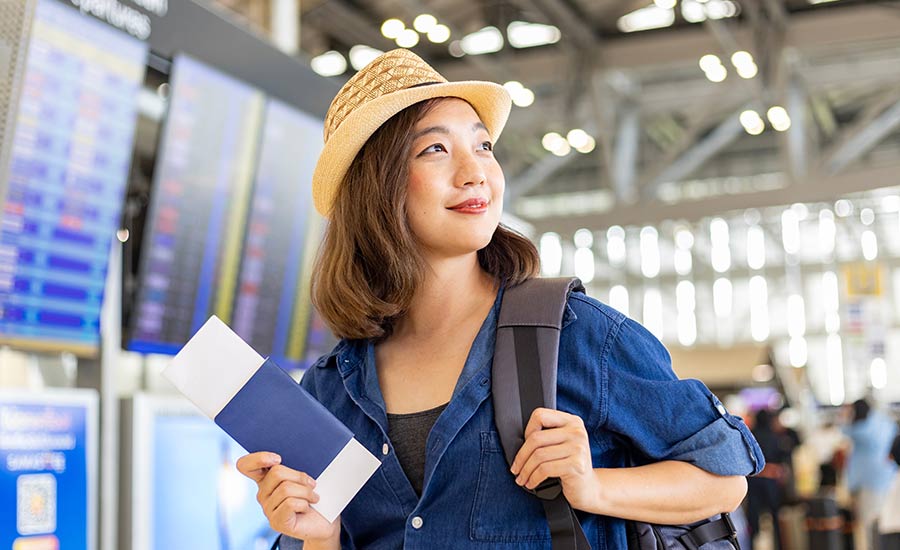

Are you wondering what it takes to succeed in your U.S. visa interview? You’re not alone.
Whether you are applying for a tourist, student, work, or family visa, it is natural to worry about saying the right thing, providing the correct documents, or handling unexpected questions.
In this guide, we will walk you through what to expect and how to prepare for your U.S. visa interview, so you can feel confident and ready.
What Is A US Visa Interview?
A U.S. visa interview is a crucial step in the visa application process, where applicants meet with a consular officer to determine their eligibility.
Visa interviews are required for various visa types, including student visas, work visas, tourist visas, or even immigrant visas.
The purpose of the interview is to verify the applicant’s information, assess their intent, and evaluate whether they meet the specific requirements for the visa category.
The interview is typically conducted at a U.S. Embassy or Consulate in the applicant’s home country.
Types Of US Visa Interviews
Different types of visas require different types of interviews. Here’s an overview of some of the most common U.S. visa categories and what to expect during their interviews:
Tourist and Business Visas (B1/B2)
- Purpose: For short-term visits to the U.S. for business (B1) or tourism, medical treatment, and family visits (B2).
- Interview Focus: The consular officer will typically ask about your travel plans, financial stability, ties to your home country, and your intent to return home after the trip.
- Common Questions:
– What is the purpose of your visit?
– How long do you plan to stay in the U.S.?
– Do you have family or employment ties in your home country?
Student Visas (F1, J1, M1)
- Purpose: For those intending to study in the U.S. (F1), participate in exchange programs (J1), or attend vocational programs (M1).
- Interview Focus: The interview often focuses on your educational background, why you chose a particular institution, your plans after completing the program, your intent to go home after studies are complete, and your financial ability to cover tuition and living expenses.
- Common Questions:
– Why did you choose this school/program?
– What are your career plans after graduation?
– How will you pay for your studies in the U.S.?
Work Visas (H1B, L1, O1)
- Purpose: For employment in the U.S., typically sponsored by a U.S. employer.
- Interview Focus: The officer will ask you about your qualifications for the job, details about your employer, your role, and your intent to return home after the visa expires.
- Common Questions:
– What is your job role and responsibilities?
– Can you describe your work experience and educational background?
– How long do you intend to work in the U.S.?
Marriage-Based Visas (K1, CR1/IR1, F2)
- Purpose: For those joining family members in the U.S., such as a spouse or dependent family members.
- Interview Focus: The consular officer will assess the authenticity of the relationship, financial support, and intentions for living in the U.S.
- Common Questions:
– How did you meet your spouse?
– What do you know about your partner’s family and background?
– Can you show proof of your ongoing relationship (photos or messages)?
Exchange Visitor Visas (J1)
- Purpose: For participants in exchange programs that promote cultural exchange, training, or research.
- Interview Focus: The officer will look into your program details, the cultural exchange component, and your plans to return home after completing the program.
- Common Questions:
– What skills or knowledge do you expect to gain through this program?
– How will you use these skills when you return to your country?
– How long is your program, and what is your role?
Religious Worker Visas (R1)
- Purpose: For individuals working in religious capacities in the U.S.
- Interview Focus: The interview will focus on your religious organization and your role.
- Common Questions:
– What is your religious denomination?
– How long have you been affiliated with this religious organization?
– What specific work will you be doing in the U.S.?

How To Prepare For A Visa Interview
The visa interview is often the final and most critical step in the application process. To increase your chances of approval, approach it with a clear plan.
Research Visa Requirements & Process
Understanding the requirements and process for the visa you’re applying for is important as each visa category has unique eligibility criteria, documentation, and interview expectations.
- Know the purpose of your visa: Make sure you understand what the visa type allows you to do — for example, study, work, or visit the U.S.
- Review the Consulate’s guidelines: Each consulate may have different instructions regarding what documents to bring or how the interview will be conducted. Visit the official website to get up-to-date information.
Know Your Travel Plans & Accommodation Details
During your interview, you’ll likely be asked about your travel itinerary and where you’ll be staying. Be ready to discuss these details.
- Prepare your itinerary: Know the exact dates of your intended travel, the purpose of your visit, and key locations you’ll be visiting. Avoid vague answers like “I’m not sure yet.”
- Provide accommodation information: Have the full address and booking confirmation available, whether it’s a hotel booking or temporary stay with a relative. This shows that your trip is well-planned.
- Demonstrate your intent to return: For nonimmigrant visas, provide evidence of strong ties to your home country, such as property, family, or employment. This can help you prove you don’t intend to overstay.
Gather All Required Documentation
Missing or incomplete paperwork is one of the most common reasons for visa denial.
- Use a checklist: Create a checklist based on the Consulate’s requirements. Typical documents include your passport, visa application form, appointment confirmation, financial statements, travel itinerary, and any visa-specific documents like acceptance letters or job offers.
- Organize documents by category: Use folders or labeled sections to group your documents, making it easy to find what you need during the interview.
- Double-check for accuracy: Make sure that all documents are up to date and error-free. Even minor inconsistencies can raise suspicions.
Practice Common Visa Interview Questions
Knowing what questions might be asked can help you prepare clear and concise answers.
While each visa type has its own set of questions — for example, related to your academic background if you are applying for a student visa, or relationship if you are filing for a family visa — there are also some common ones.
For example,
- Why do you want to visit the U.S.?
- Who is sponsoring your trip?
- Do you have family or employment ties in your home country?
Conduct mock interviews with someone playing the role of the consular officer. This helps you practice your responses under pressure and fine-tune your answers.
Practice Your English
Being comfortable with the language is key as some of the visa interviews may be conducted in English.
- Work on conversational English: Focus on everyday conversation rather than memorized responses. This will help you sound natural and confident.
- Practice specific vocabulary: Use words related to your visa type. If you are applying for a student visa, familiarize yourself with terms related to academic programs, courses, and university procedures. If you are filing for a family visa, focus on terms related to relationships and your family structure.
- Get feedback: Practice with friends, family, or a language tutor who can provide feedback on your pronunciation and grammar.

3 Things To Avoid During A Visa Interview
To present yourself successfully at a visa interview, try to avoid certain pitfalls that could raise concerns for the consular officer. Here are three key things to watch out for:
1. Dishonest Answers
Providing information that contradicts your application or giving false details can immediately raise red flags.
Always stick to the truth and make sure that your answers align with the documents you’ve submitted.
2. Unfocused Responses
Offering unnecessary details can make you appear uncertain or raise doubts about your intent.
Focus on answering the specific question in a clear and concise manner.
3. Negative Body Language
Fidgeting, avoiding eye contact, or showing excessive nervousness can be interpreted as a lack of confidence or as if you’re hiding something.
Maintain calm, positive body language — sit straight, offer a polite smile and engage with the interviewer by holding steady, natural eye contact.
Need Help With Your Visa Application? Contact Spar & Bernstein
With 60 years of experience in immigration law, Spar & Bernstein have helped thousands of applicants achieve their dream of going to the U.S. and staying legally in the country.
Our knowledgeable and compassionate team offers personalized guidance tailored to your specific visa type.
From ensuring your documentation is accurate and complete to helping you prepare for your visa interview, we will help you confidently present your case and increase your chances of securing your U.S. visa.
FAQs About US Visa Interviews
For more information about U.S. visa interviews, here are answers to frequently asked questions.
How long does a U.S. visa interview typically last?
Most visa interviews are brief, typically lasting between 10 and 20 minutes.
What should I wear to the visa interview?
Dress neatly and professionally, as you would for a job interview. Your attire should reflect that you’re taking the process seriously without being too formal or casual.
What if my financial documents are not in English?
All supporting documents for your specific visa category should be in English or accompanied by an official translation. This ensures the consular officer can easily review and verify the information without language barriers.


